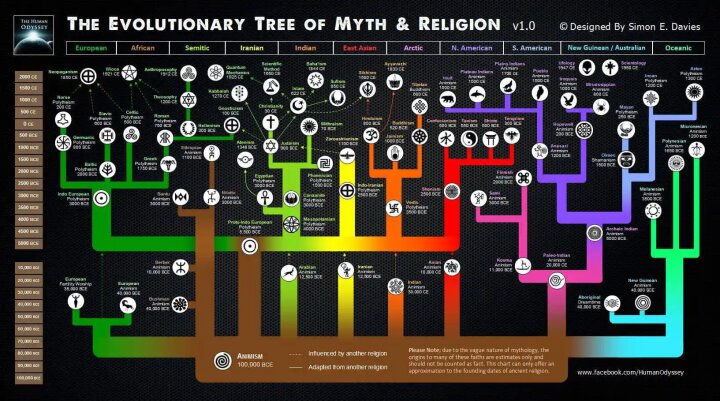Religion: Origins
As far as we can determine there has never existed any people anywhere at any time who were not in some sense of the word religious. It is only recently, however, that careful study of the origins of religion and its development has been undertaken. Throughout most of mankind’s history ones religious tradition was something one was born into without choice, often without the knowledge of any other alternative. In the 19th century, with mass migration, and improved means of communication and travel that began to change.
The arrival of scientific inquiry and especially the theory of evolution also inspired the intellectual to question established institutions including religion. Through the methodology of anthropology, sociology and psychology mankind strived to search through the human mind as well as the ruins of ancient civilizations to find answers about his spiritual past and present yearnings.
Some of the theories that were most prominent were that religion sprang from primitive people’s belief that the immortal soul remained after death, inhabiting the things around them. Dreams, hallucinations and visions of dead ancestors allegedly inspired this. Then came the idea that primitive people believed, not in the personal immortal soul, but rather, the impersonal supernatural force which controlled everything. This supposedly came from a fear and awe of the unknown. Another theory suggests that religion came from magic - an attempt to control the environment around our primitive ancestors by imitating nature. Sprinkling water while beating drums to sound like thunder would produce rain, for example.
It is impossible to guess, with any degree of accuracy or ability to confirm, the origins of religion. More often these theories are veiled attempts to explain religion away by dismissing early forms to have been based upon illusions, ignorance and fear, thereby undermining religion in general. No tenable explanations have been introduced and yet from a faulty premise the illusion of a sound conclusion is, somewhat ironically, based more upon ignorance and fear. Science and religion have a great deal more in common than either would care to admit.
It is also apparent that many of the concepts of the world religions, though separated geographically, traditionally, culturally, and socially, have a great deal more in common than one might think.
The arrival of scientific inquiry and especially the theory of evolution also inspired the intellectual to question established institutions including religion. Through the methodology of anthropology, sociology and psychology mankind strived to search through the human mind as well as the ruins of ancient civilizations to find answers about his spiritual past and present yearnings.
Some of the theories that were most prominent were that religion sprang from primitive people’s belief that the immortal soul remained after death, inhabiting the things around them. Dreams, hallucinations and visions of dead ancestors allegedly inspired this. Then came the idea that primitive people believed, not in the personal immortal soul, but rather, the impersonal supernatural force which controlled everything. This supposedly came from a fear and awe of the unknown. Another theory suggests that religion came from magic - an attempt to control the environment around our primitive ancestors by imitating nature. Sprinkling water while beating drums to sound like thunder would produce rain, for example.
It is impossible to guess, with any degree of accuracy or ability to confirm, the origins of religion. More often these theories are veiled attempts to explain religion away by dismissing early forms to have been based upon illusions, ignorance and fear, thereby undermining religion in general. No tenable explanations have been introduced and yet from a faulty premise the illusion of a sound conclusion is, somewhat ironically, based more upon ignorance and fear. Science and religion have a great deal more in common than either would care to admit.
It is also apparent that many of the concepts of the world religions, though separated geographically, traditionally, culturally, and socially, have a great deal more in common than one might think.








